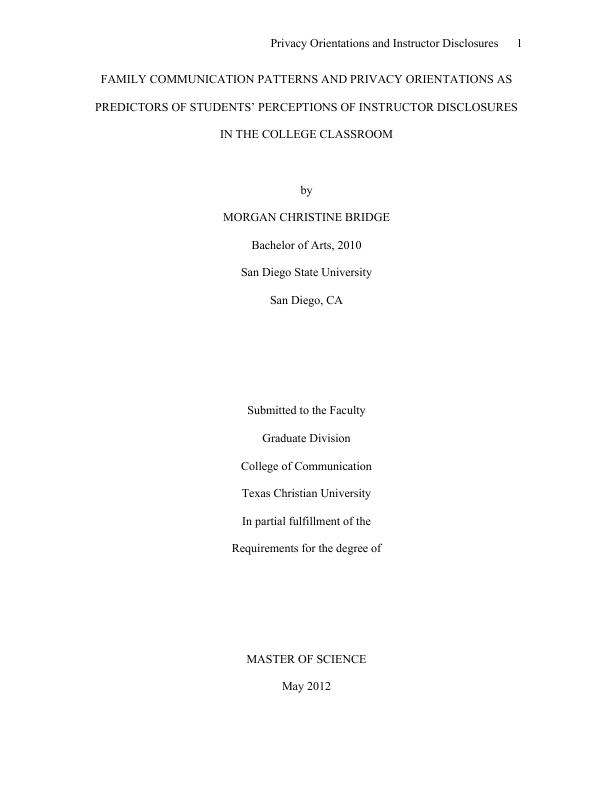Family communication patterns and privacy orientations as predictors of students' perceptions of instructor disclosures in the college classroomShow full item record
| Title | Family communication patterns and privacy orientations as predictors of students' perceptions of instructor disclosures in the college classroom |
|---|---|
| Author | Bridge, Morgan Christine |
| Date | 2012 |
| Genre | Thesis |
| Degree | Master of Science |
| Abstract | Using Petronio's (2002) Communication Privacy Management theory, the current study sought to explore the relationship between family communication patterns, privacy orientations, and students' perceptions of instructor disclosures. The study examined the degree to which students' privacy orientations and family communication patterns (i.e., conversation and conformity orientations) are associated with their perceptions of the frequency, relevance, and appropriateness of instructor disclosures in the college classroom. The results indicate that two dimensions of family communication patterns (i.e., conversation and conformity orientations) are associated with students' privacy orientations. Specifically, individuals from conversation oriented families tend to be more open and less private, yet individuals from conformity oriented families are more likely to be closed and private. Further, the results offer some support for the associations among family communication patterns (i.e., conversation and conformity orientations) and the frequency, relevance, and appropriateness of instructor disclosures in the classroom. While little support was found for the associations among students' privacy orientations and perceptions of instructor disclosures (i.e., frequency, relevance, and appropriateness), students with a weak privacy orientation are more likely to perceive instructors' disclosures as more frequent. Although privacy orientations did not mediate the association between individuals' family communication patterns and perceptions of instructor disclosures in the college classroom, family communication patterns and privacy orientations accounted for a unique percentage of the variance in students' perceptions of instructor disclosure frequency. Collectively, the results from this study contribute to the research on instructor disclosures by accounting for family communication patterns and privacy orientations as influential factors in the instructional context |
| Link | https://repository.tcu.edu/handle/116099117/4377 |
| Department | Communication Studies |
| Advisor | Schrodt, Paul |
Files in this item
This item appears in the following Collection(s)
- Masters Theses [4182]
© TCU Library 2015 | Contact Special Collections |
HTML Sitemap



